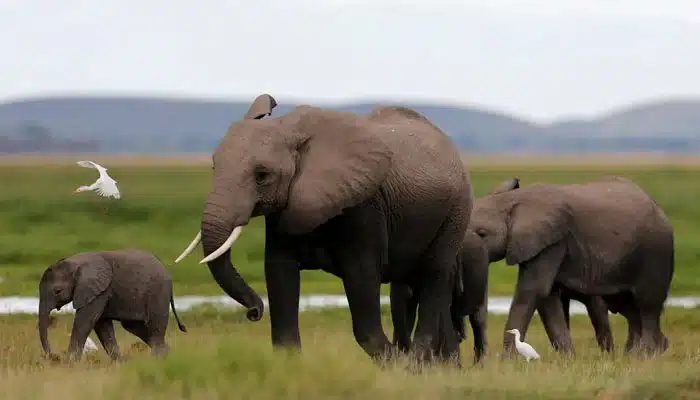A new study has has revealed an alarming population decline in African elephant populations across numerous sites on the continent over approximately half a century, Reuters reported.
On Monday, researchers revealed what they described as the most comprehensive assessment to date of the two African elephant species — the savanna elephant and the forest elephant — using population survey data from 475 sites in 37 countries between 1964 and 2016.
The study found that savanna elephant populations fell by about 70% on average at the surveyed sites, while forest elephant populations dropped by about 90%, with poaching and habitat loss as the main drivers. Overall, there was an average population decrease of 77% across the surveyed sites for both species.
In some areas, elephants disappeared entirely, while in others, populations grew thanks to conservation efforts.
“A lot of the lost populations won’t come back, and many low-density populations face continued pressures. We will likely lose more populations in the future,” said George Wittemyer, a professor of wildlife conservation at Colorado State University and chair of the scientific board of the conservation group Save the Elephants. Wittemyer co-led the study, which was published in the journal Proceedings of the National Academy of Sciences.
Poaching, which typically involves the killing of elephants for their tusks, has been driven largely by demand for ivory in China and other parts of Asia. Habitat loss is primarily due to agricultural expansion.
The population of forest elephants is estimated to be about a third of that of savanna elephants. Forest elephants have been disproportionately affected by poaching, which has devastated populations of both species in northern and eastern Africa.
“We have lost a number of elephant populations across many countries, but the northern Sahel region of Africa — for instance, in Mali, Chad, and Nigeria — has been particularly hard hit. High pressure and limited protection have resulted in the extirpation of these populations,” Wittemyer said.
In southern Africa, however, elephant populations rose at 42% of the surveyed sites.
“We have seen real success in parts of Africa, particularly in southern Africa, where there has been significant growth in populations in Botswana, Zimbabwe, and Namibia. For populations showing positive trends, active stewardship and management by governments or outside groups have been key,” Wittemyer said.
The study did not attempt a continent-wide population tally, as the various surveys used different methodologies over different timeframes to estimate local elephant densities, making a unified count unfeasible. Instead, it assessed population trends at each site surveyed.
A separate conservationist-led estimate put the combined population of the two species between 415,000 and 540,000 elephants as of 2016, the last year covered by the study period, which remains the most recent comprehensive continent-wide estimate.
“The loss of large mammals is a significant ecological issue for Africa and the planet,” said conservation ecologist and study co-author Dave Balfour, a research associate in the Centre for African Conservation Ecology at Nelson Mandela University in South Africa.
The slightly smaller Asian elephant, the world’s third extant elephant species, faces its own population crisis, impacted by similar factors as African elephants.
While Wittemyer acknowledged the grim trends, he also highlighted the importance of recognising successful conservation efforts. “Learning how and where we can be successful in conserving elephants is as important as acknowledging the severity of their decline.”
He added, “African elephants are not only among the most sentient and intelligent species we share the planet with but also play a crucial ecological role. They maintain the balance between forest and grasslands, disperse seeds, and support a multitude of other species that depend on them for survival.”

